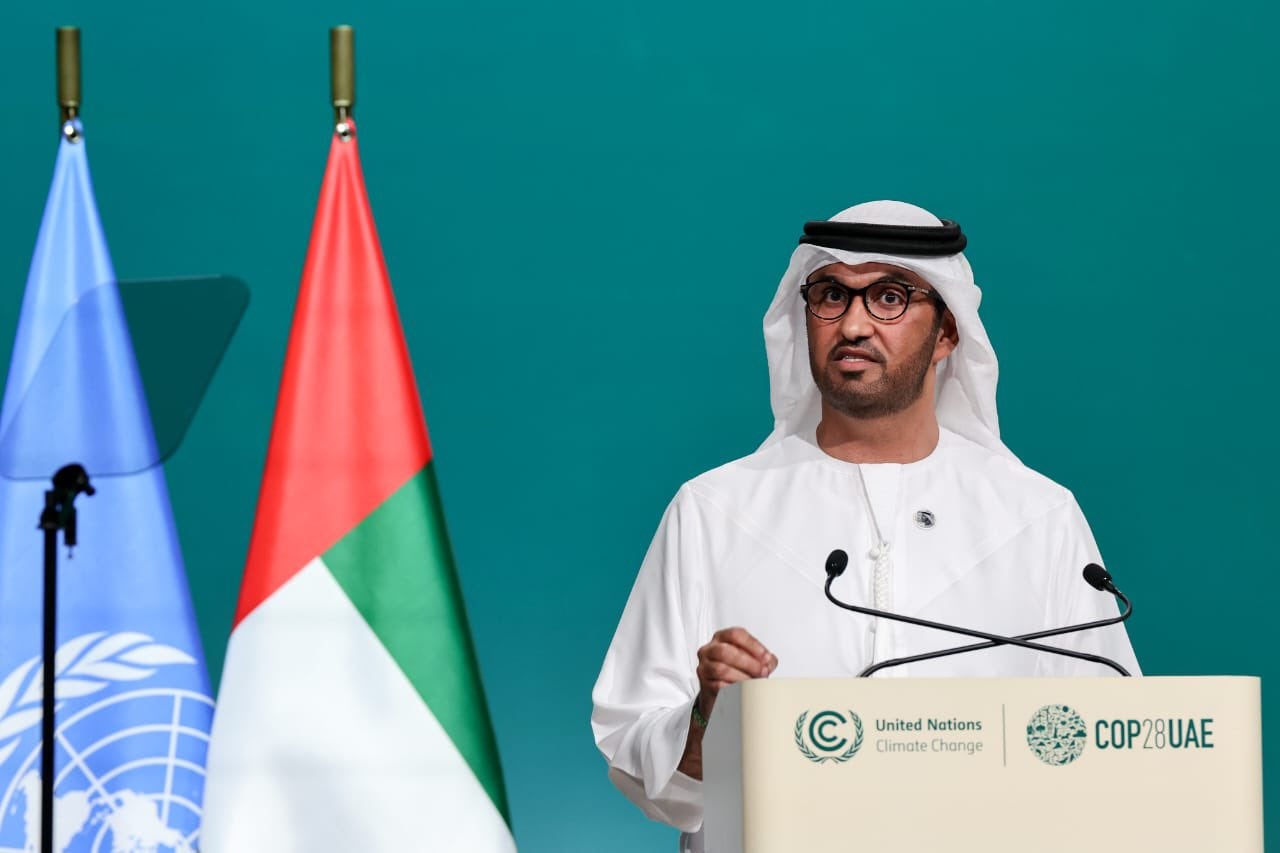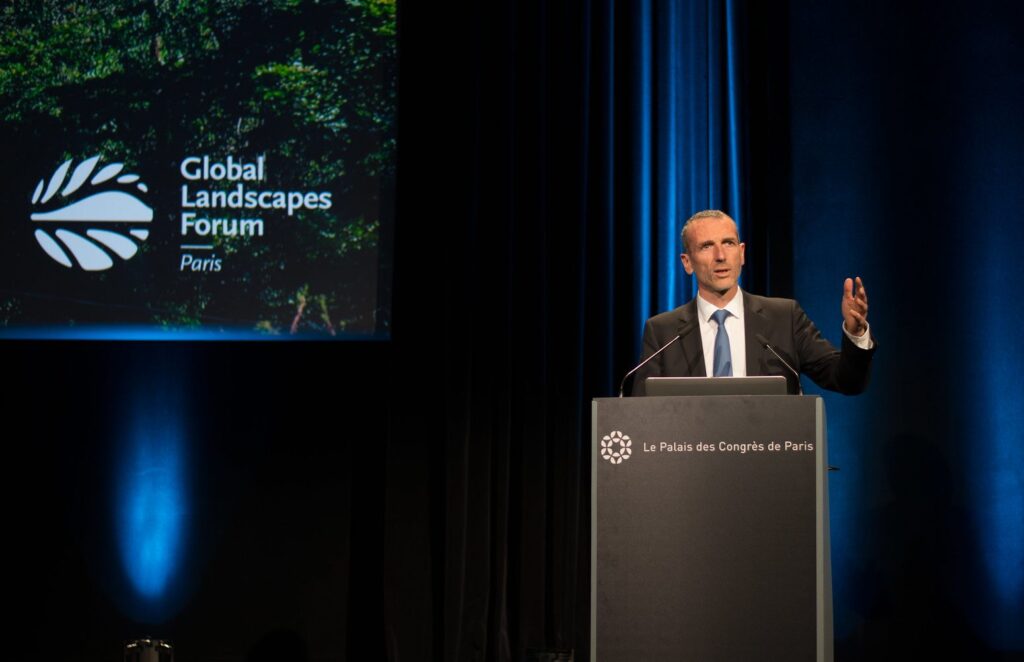
It’s time for another COP. Dubai marks the 28th in the series of crucial but ultimately confounding climate talks. It is once again crunch time. So, expect flimsy agreements and a lot of flirting with ambitious ideas. Newspapers will delight in reporting the flight footprints of delegates and 13 days of grim headlines (guaranteed). “This year, diplomats are expected to argue over whether to phase out fossil fuels and who should help poorer nations pay for climate damages,” reported the Financial Times this week.
Isn’t that always the case? Or at least it has been since the Paris Agreement of 2015? This year will, however, be different in one way.

Discover B2B Marketing That Performs
Combine business intelligence and editorial excellence to reach engaged professionals across 36 leading media platforms.
The future of fossil fuels will again dominate proceedings but food – a sector responsible for around a third of global greenhouse emissions – is finally on the radar, too. Day 10, for example, is dedicated to the topic. There are also numerous other side events taking place (one WhatsApp group your correspondent is in with almost 200 attendees, activists and media has decided not to promote any events within the group for fear of bombardment).
There are key moments to look out for. COP hosts, the UAE, want governments to integrate food and agriculture into national climate plans. On Monday, ministers will discuss a global methane pledge, though action on livestock is expected to be limited, according to campaigners. There is also the highly anticipated FAO Roadmap to achieving 1.5°C to look forward to. This will “present a package of agrifood solutions that will contribute to the climate, biodiversity, and food security agendas”. Some are hopeful this might go as far as suggesting rich countries reduce meat and dairy consumption. Don’t bet on it.
The climate meat
It will be no surprise that with food on the agenda at COP, it’s the meat industry that some campaigners will want to hang out to dry. This week, there has already been an eye-popping investigation into the lobbying tactics that meat and dairy companies have used on social media (Changing Markets Foundation) and leaks of plans of how the industry aims to sell meat as “beneficial to the environment” (DeSmog and The Guardian).
“Any credible action to reduce emissions in the food sector will inevitably lead to a reduction in the total volume of meat and dairy products produced,” said Nusa Urbancic, CEO the Changing Markets Foundation, a campaign group. “The industry is terrified of that and has been deploying multiple tactics to delay the inevitable.”

US Tariffs are shifting - will you react or anticipate?
Don’t let policy changes catch you off guard. Stay proactive with real-time data and expert analysis.
By GlobalDataThe foundation has just produced an analysis of 285 million social media posts and found almost 1 million of them to “bend the truth to promote meat and dairy or attack greener alternatives and climate science”. Online attacks on alternative proteins and posts that exaggerate the benefits of meat and dairy were traced directly to industry. No wonder, then, that around three-quarters of Americans don’t think eating meat and dairy would have any impact on climate change, according to a survey conducted by the Washington Post and the University of Maryland recently.
Retailers also appear more than happy for shoppers to make up their own minds – even if they’re confused. Speaking at a European Food Forum in Brussels last month on the subject of ‘climate-neutral’ products, Miriam Schneider, director of EU affairs at the Federal Association of the German Retail Grocery Trade (BVLH), suggested that “empowering is always better than nudging or prohibiting”, for example by telling people they can’t eat meat now.
It’s not just social media where there is conflation and obfuscation. JBS chief executive Gilberto Tomazoni was recently embarrassed by the company’s crass approach to climate change. An interview with the New York Times’ climate writer David Gelles showed the world’s largest meat producer has no plan, no strategy, not even any decent data – and yet has brought forward its net-zero target by ten years to 2040 “because we recognise the emergency”.
Tomazoni made some of the usual noises. He spoke of regenerating land and “bringing it back to life”, with trees, grain and animals farmed together apparently producing 40% more food and less carbon. Easy to say; harder to prove.
Proof and the protein pudding
Food companies are certainly struggling to live up to their own hype on net-zero. “[…] a company of our scale has a real opportunity to shift the needle. A responsibility,” wrote Paul Skehan, vice president EU and international government affairs for PepsiCo, the Doritos and Walkers maker, in a blog for Politico in October. “[…] by doing what’s right for people and the planet, we can grow our business.”
PepsiCo’s most recent update on its efforts to reduce carbon emissions shows its footprint increasing by 4% to 61MtCO2e, against a 2015 baseline. Others are in a similar position. An analysis of the 20 largest meat and dairy producers in the world, conducted by the $70 trillion-backed FAIRR investor network, shows an increase of 3.28% between 2022 and 2023. The group includes firms like Hormel Foods (US) and New Hope Liuhe (China), suppliers to household names such as Walmart and McDonald’s respectively.
Just Food produced its own analysis this time last year, showing that greenhouse gas emissions across nine of the world’s largest food companies increased by a combined 27MtCO2e in the previous 12 months. Brands can’t seem to contain their Scope 3 emissions (which is why regenerative is being billed as a silver bullet – more on that later). PepsiCo says its rising emissions “illustrates a common challenge for companies combating climate change: reducing emissions while maintaining business growth”.
Don’t miss our coverage of COP28! Subscribe here for exclusive insights & analysis.Mars appears to be one of those bucking the trend. According to data published by the New York Times it has managed to cut emissions (all scopes) by 8% and increase revenue by 60%. “This isn’t a trade-off for us,” said Barry Parkin, the company’s chief procurement and sustainability officer. “It’s a goal that is as important to us as our financial performance.”
Finding such a sweet spot isn’t easy (and will be harder to find as the emissions reduction curve gets steeper and shareholders become more agitated). Just ask Unilever or Danone – companies widely regarded as leaders in ESG but which have been criticised for putting purpose over profit.
Unilever, the maker of Marmite and Hellmann’s, was last year pasted for “losing the plot”. Emmanuel Faber, formerly the CEO of Danone, lost his job as his environmental leadership did not convince some shareholders concerned about the company’s financial performance. “We fear that ESG [environmental, social and governance] has increasingly been used by chief executives to justify underperformance,” Marco Taricco, co-chief investment officer at Bluebell Capital Partners, an activist that campaigned at Danone, said last year.

Other chief executives will be using such examples as an excuse to put the brakes on their net-zero plans. EY’s ‘DNA of the CFO’ study showed that sustainability programmes are rated the most important long-term investment priority for CFOs but are also the most likely initiative to be cut or paused to hit short-term earnings targets.
Faced with geopolitical, supply chain and inflation challenges as we head into (another) crunch climate summit it is difficult to know what food companies can, or will, say.
Bench pressure
The World Benchmarking Alliance (WBA) 2023 assessment of the world’s 350 largest agri-food companies included 243 food and drink manufacturers: only six of them scored half marks or more on their work around emissions reporting and reductions, soil health and diversification of the proteins in their portfolios (towards plant-based options). Across all 350 companies disclosure of Scope 3 emissions, which make up 80% or more of most food company carbon footprints, has improved slightly, but only 13 have set a reduction target aligned with 1.5C. Almost half (47%) still don’t disclose anything relating to Scope 3 emissions, while another quarter (27%) offer some measurements of these critical emissions.
Do we need to make more of the huge number of laggards, who are not even reporting or measuring Scope 3 emissions for example? And if the pioneers are attacked for what they are reporting won’t this make the laggards think twice about improvements and transparency of their reporting? “Good sustainability performance isn’t consequential enough,” says WBA food and agriculture transformation lead Viktoria de Bourbon de Parme. “This means laggards can lag.”
They can. And do. Others have begun to shrink into their shells on sustainability. Some have realised net-zero will be painful. Some have been scared from the sustainability spotlight when campaigners are quick to cut them down, think tanks unpick their plans with fine-tooth combs and regulators chuck sticks, too. Has it really come to a direct choice between greenwash or greenhush?
“We don’t want to discourage all corporate action. But we also don’t want to license greenwashing,” explains Gilles Dufrasne from Carbon Market Watch, an NGO. “The solution might be in accepting the imperfectness of what most can do today, and be transparent about it.”
Honesty and context must be part of reports and net-zero plans. At COP26, companies could get away with a press release but this time around it is progress rather than promises that consumers, investors and campaigners are after. Glenn Hurowitz, founder and CEO of Mighty Earth, says he would always choose a company making progress over an “astonishing” report or piece of research that vilifies them. This COP is about “implementation, implementation, implementation”, he says.
It is also about collaboration and regeneration. The former is a word oft-used in association with environmental progress but there are huge untapped opportunities. Consider for example that WBA assessed companies against 46 indicators of performance and 32 of them have at least one company demonstrating a leading practice. If all of those leading practices currently being implemented across several companies were combined, that fictional, best-performing company would score 92/100 in total (compared to the real top-scoring company, Unilever, which achieved 68/100).
Trust
And finally, a word on regenerative – or regen ag – which will crop up quite a few times over the coming days. There is certainly emissions reduction potential in a true shift to regenerative systems, but there are also concerns the term has already been co-opted by food corporates as a marketing tool. The word has already begun to appear on products, despite the lack of a legal definition. Before long it could simply become the latest in a long line of language that has made some companies rich despite being poorly defined.
As Wendell Berry, the novelist and environmental activist wrote in his essay ‘In distrust of movements’: “Once we allow our language to mean anything that anybody wants it to mean, it becomes impossible to mean what we say.”
Talk is also cheap. Food corporates looking to garner support at this year’s COP would be wise to remember that.





